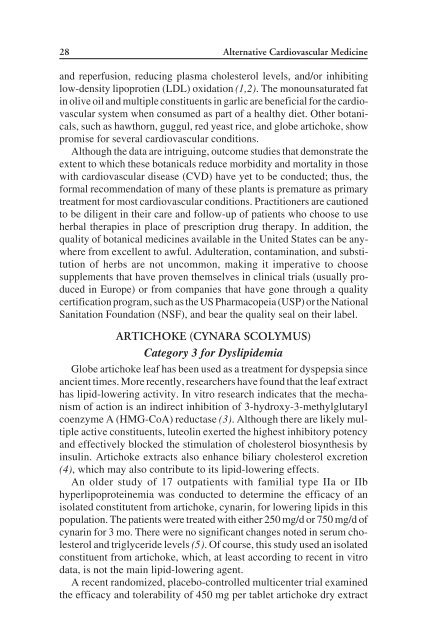Complementary Alternative Cardiovascular Medicine
Complementary Alternative Cardiovascular Medicine
Complementary Alternative Cardiovascular Medicine
Create successful ePaper yourself
Turn your PDF publications into a flip-book with our unique Google optimized e-Paper software.
28 <strong>Alternative</strong> <strong>Cardiovascular</strong> <strong>Medicine</strong><br />
and reperfusion, reducing plasma cholesterol levels, and/or inhibiting<br />
low-density lipoprotien (LDL) oxidation (1,2). The monounsaturated fat<br />
in olive oil and multiple constituents in garlic are beneficial for the cardiovascular<br />
system when consumed as part of a healthy diet. Other botanicals,<br />
such as hawthorn, guggul, red yeast rice, and globe artichoke, show<br />
promise for several cardiovascular conditions.<br />
Although the data are intriguing, outcome studies that demonstrate the<br />
extent to which these botanicals reduce morbidity and mortality in those<br />
with cardiovascular disease (CVD) have yet to be conducted; thus, the<br />
formal recommendation of many of these plants is premature as primary<br />
treatment for most cardiovascular conditions. Practitioners are cautioned<br />
to be diligent in their care and follow-up of patients who choose to use<br />
herbal therapies in place of prescription drug therapy. In addition, the<br />
quality of botanical medicines available in the United States can be anywhere<br />
from excellent to awful. Adulteration, contamination, and substitution<br />
of herbs are not uncommon, making it imperative to choose<br />
supplements that have proven themselves in clinical trials (usually produced<br />
in Europe) or from companies that have gone through a quality<br />
certification program, such as the US Pharmacopeia (USP) or the National<br />
Sanitation Foundation (NSF), and bear the quality seal on their label.<br />
ARTICHOKE (CYNARA SCOLYMUS)<br />
Category 3 for Dyslipidemia<br />
Globe artichoke leaf has been used as a treatment for dyspepsia since<br />
ancient times. More recently, researchers have found that the leaf extract<br />
has lipid-lowering activity. In vitro research indicates that the mechanism<br />
of action is an indirect inhibition of 3-hydroxy-3-methylglutaryl<br />
coenzyme A (HMG-CoA) reductase (3). Although there are likely multiple<br />
active constituents, luteolin exerted the highest inhibitory potency<br />
and effectively blocked the stimulation of cholesterol biosynthesis by<br />
insulin. Artichoke extracts also enhance biliary cholesterol excretion<br />
(4), which may also contribute to its lipid-lowering effects.<br />
An older study of 17 outpatients with familial type IIa or IIb<br />
hyperlipoproteinemia was conducted to determine the efficacy of an<br />
isolated constitutent from artichoke, cynarin, for lowering lipids in this<br />
population. The patients were treated with either 250 mg/d or 750 mg/d of<br />
cynarin for 3 mo. There were no significant changes noted in serum cholesterol<br />
and triglyceride levels (5). Of course, this study used an isolated<br />
constituent from artichoke, which, at least according to recent in vitro<br />
data, is not the main lipid-lowering agent.<br />
A recent randomized, placebo-controlled multicenter trial examined<br />
the efficacy and tolerability of 450 mg per tablet artichoke dry extract


